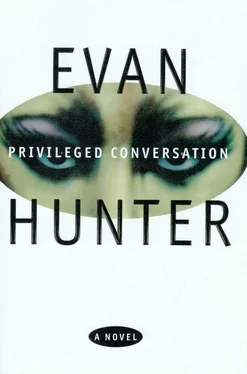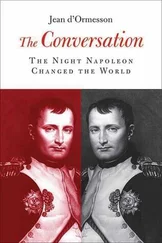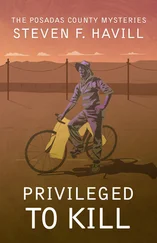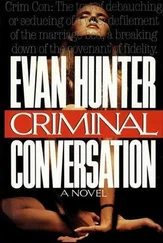“Sometimes. Sometimes, if you ignore them, they...”
“I am ignoring him.”
“I know that. What I’m saying, sometimes they just get bored or whatever and go away.”
“He doesn’t seem to be getting bored.”
“No, he doesn’t, but sometimes they just quit all of a sudden. There are lots of women out there, you know.”
“Yes,” she says, and nods thoughtfully.
“So how would you like to proceed?”
“What I’m afraid of, you see, is if somebody goes to talk to him, he’ll come after me .”
“Well... I really think that’s a very remote possibility.”
“But a possibility, right?”
“Anything’s possible, Miss Duggan. The roof of this building could fall in on us right this minute. That’s a possibility, but a very remote one. I really don’t think this person would try to harm you after somebody from the police talked to him.”
“But he might.”
“There’s no telling what crazy people will do, but in my experience...”
“I’d like to give it some further thought,” she says.
“Entirely up to you,” Clancy says, with what she detects as a slight dismissive shrug. He opens the top drawer of his desk again, takes from it a large manila envelope printed with the words POLICE DEPARTMENT — CITY OF NEW YORK and below that the bolder word EVIDENCE.
Evidence, she thinks.
He turns down the flap of the envelope. There are two little red cardboard buttons on the envelope, a red string dangling from the one on the flap. He wraps the string around the lower button.
“You’d better hang on to these,” he says. “Case you decide.”
David calls collect on Monday evening.
He reminds her that his plane will arrive in Newark at seven thirty-eight tomorrow morning.
“I’ll be there,” she says.
Hurry, she thinks.
Please hurry.
And closes the blinds against the encroaching dusk.
4: tuesday, august 15 — saturday, august 19
David knows at once that something is wrong.
She stands just past the security gate waiting for him, a black umbrella in her hand, her red hair pulled up under a man’s gray fedora that hides it completely, a black raincoat buttoned to her throat, jeans and yellow rain boots showing below the hem. She looks as if she’s been crying.
“What’s wrong?” he asks.
“Lots,” she says, and kisses him swiftly on the cheek.
It is pouring outside the terminal. Kate has borrowed a car from one of the “kids” in the show, and it is tiny and cramped, and there is a faint whiff of stale sweat wafting from the backseat, which is littered with leg warmers, leotards, tights, socks, panties, bras and a tangled assortment of unidentifiable soiled or stained garments waiting to be transported to the Laundromat. Or the city dump.
She begins crying the moment she pulls the car out of the airport parking lot.
“What is it?” he says.
In fits and starts and bits and pieces, like a patient dredging up a traumatic experience, she rambles tearfully through the events of the past two weeks and more, starting with the delivery of the first box of roses, “I thought they were from you, well, naturally, the card said I love you, Kathryn,” and then the subsequent flowers, all of them sent to the theater and delivered to the dressing room, four boxes of roses altogether, long-stemmed roses, all with a different florist’s card saying I love you, and then the letters started, ten letters in all, so far. She’ll show him the letters when they get home, Clancy said it’s a crime, the detective, remember? From that time with my bike? I went to see him Saturday. Each letter constitutes a separate count of Aggravated Harassment, but he can only get two years in aggregate, whatever that means, I’ve been so frightened.
Bursting into tears again, trying to choke the tears back while David listens in amazement to the recited contents of the letters as she’s memorized them, the voice of a man obsessed if ever he’s heard one, and he most certainly has heard plenty of them. Once again, he listens to the familiar symptoms, altered to accommodate the scenario with Kate, the expected shift from reality to fantasy, Kathryn becoming Victoria, Victoria becoming a kitten and then a pussy, the repetitive fixation on the slang expression for the vagina, the slavish supplication, the reversal of roles so that he now becomes lord and master, the possessiveness and jealous rage, the abusive language and escalating obscenity, the initially veiled threats, the later open sexual invitation-cum-threat, the final threat against Rickie...
“Rickie?” he says. “Who’s Rickie?”
“The kid from the bike shop,” she says.
How’d he get into this? David wonders.
“How’d he get into this?” he asks aloud, and turns to her in puzzlement, his knees banging against the dashboard in this goddamn toy car. He should be listening to this in the limo she promised, he should be holding her in his arms while somebody else drives, telling her he’s here, assuring her that everything will be all right.
Well, she goes on to explain, crying more fiercely now, frightening him because it’s raining very hard and there’s quite a bit of traffic heading into the city at this hour of the morning, and he doesn’t want her to run into one of the trucks rolling ponderously toward the George Washington Bridge, but how can she see through this driving rain and her own veil of tears, her vale of tears? Well, she says, I got very scared when he sent the letter to my building because that meant he’d followed me from the theater and he knew where I lived, and it sounded very threatening, the business about my wanting it as much as he did and now he knew where to get it and all, it sounded like somebody getting ready to rape me, for Christ’s sake! And you were away , David, don’t forget that, you weren’t here, you hadn’t even called , where the hell were you?
She is beginning to sound hysterical, he has dealt with hysteria before. “Honey,” he says, “calm down, I’m here now,” but she keeps ranting about how she had to go to someone and the only one she could think of was Rickie, the kid from the bike shop, who was kind enough and brave enough to take her for something to eat after the show, and walk her home afterward, so that fucking lunatic would think he was her boyfriend and get scared off.
“Kate, watch the road,” he warns.
“It isn’t as if I have a brother or a father I can turn to,” she says, “and my sister is helpless, of course, and even if my mother wasn’t in San Diego, she wouldn’t give a damn if an ax murderer was following me. You don’t know what she’s like, David...”
And now he listens to a furious recitation that truly could come from any one of his patients, a conversation so privileged that it transforms this teeny-weeny car into a psychiatrist’s cubicle, or, more accurately, a priest’s confessional. Patiently, he listens. This is the woman he loves, and she is in serious trouble. As the windshield wipers snick at the incessant rain, he listens.
The fury she expends on her mother has one dubious side effect in that it stanches the flow of tears and forces a hunched-over-the-wheel concentration on the road, as if Kate is driving this tiny car not only through the fiercely slanting rain but also, like a sharpened stake, directly into her mother’s heart. Her mother’s name is Fiona, but it could just as easily be Shirley, or Rhoda or Marie or Lila, who are the respective reviled mothers of Arthur K, Alex J, Susan M and Michael D, or for that matter David’s own mother Ruth before he went through the extensive analysis that put his hatred for her to rest. (A father named Neil lurks in the background of Kate’s fiery recitation, somewhat like a shadow lingering offstage, a fact that brings him immediately to prominence in David’s trained analytical mind.) But her rage seems exclusively directed toward Fiona as the car approaches the bridge in a similarly raging storm that buffets it with wind and water. Everywhere around them, rumbling trucks lumber like dinosaurs.
Читать дальше











